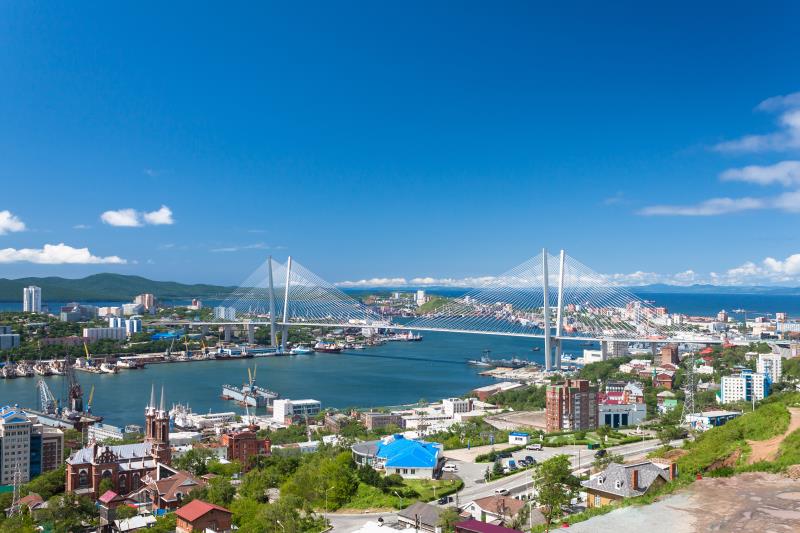


Photo/provided to People's Daily Online
The expanded version of the 4th Eastern Economic Forum Business Programme has been published, with more information on session descriptions, the main topics of discussion, and key speakers.
The programme features around 70 business events, including panel sessions, business dialogues, business breakfasts, and roundtables. A traditional highlight of the forum is the Plenary Session with President of the Russian Federation Vladimir Putin. The theme of the EEF 2018 is 'The Russian Far East: Expanding the Range of Possibilities'.
"In three years, the Eastern Economic Forum has become an effective international communication platform. EEF events are attended by leaders of states and governments all over the Asia-Pacific Region and executives from the leading international companies in Russia and abroad. The Forum's speakers include the foremost experts representing the Russian and international political elite and civil society and outstanding scientists and public figures. Their participation allows the discussions at the EEF to be particularly productive," noted Adviser to the President of the Russian Federation, Executive Secretary of the Eastern Economic Forum Organizing Committee Anton Kobyakov.
The EEF 2018 business programme is meant to focus discussions on four key areas.
The first thematic section, 'Tools to Support Investors: Next Steps' will focus on the results and potential of investor support mechanisms for developing areas such as the Territories of Advanced Development and the Free Port of Vladivostok. The discussion is expected to touch on the issues of protecting investor's rights, supporting business through infrastructure, the creation of a Russian offshore zone in the Russian Far East, and breakthrough FEFD regions in the national ranking of investment attractiveness. This block's session will be attended by Prosecutor General of the Russian Federation Yury Chaika, Presidential Commissioner for Entrepreneurs' Rights Boris Titov, Deputy Prime Minister Boris Titov, Head of the Federal Customs Service Vladimir Bulavin, President of the Russian Academy of Sciences Alexander Sergeyev, heads of the regions of the Far Eastern Federal District, and others.
The section 'Industry Priorities of the Russian Far East' will focus on the issues of supporting industries that will drive the region's economic growth in the near future. More specifically, individual sessions will consider the timber industry, agriculture, fishing industry, oil and gas industry, tourism and port infrastructure, mining and refining of solid minerals, jewellery industry, and improving legislature related to mineral exploration. These issues will be presented on by Minister of Agriculture Dmitry Patrushev, Deputy State Duma Speaker Irina Yarovaya, President of The Russian Chamber of Commerce and Industry Sergei Katyrin, Russian Export Centre General Director Andrey Slepnev, and Russian and international business executives.
The section 'A Global Russian Far East: International Projects for Cooperation' will feature business events on issues such as opportunities for economic cooperation between Russia's Far East and neighbouring countries, the importance of developing transport corridors in the Russian Far East territory for the Asia-Pacific Region, the creation of an International Medical Cluster in Vladivostok, integration and energy cooperation in the APR, and development of the resources of the World Ocean. This section will also feature TV debates and a Valdai Club session on the topic 'The New Asian Geopolitics and Political Economy: Opportunities for Russia'. The discussions will feature figures such as Deputy Minister of Foreign Affairs of the Russian Federation Igor Morgulov, Minister of Sport Pavel Kolobkov, Minister of Natural Resources Dmitry Kobylkin, Minister for Foreign Affairs of Mongolia Damdin Tsogtbaatar, Chairman of the Board of the Eurasian Economic Commission Tigran Sargsyan, and Nobel Peace Prize laureates Rae Kwon Chung and Riccardo Valentini.
The section 'Improving Living Conditions' will touch on the issues of implementing national demography, healthcare, culture, education and science, housing, and urban development projects in the Russian Far East. Participants will also discuss opportunities for improving the region's labour market, new measures for land development through the Far Eastern Hectare programme, financing social services and supporting talented individuals, increasing life expectancy, and the role of cultural institutions in regional development. The social block of sessions will be joined by representatives of relevant agencies, such as: Director General of the Agency for the Development of Human Capital in the Far East Sergei Khovrat, Head of the Federal Agency for Ethnic Affairs Igor Barinov, Head of the Federal Agency for Youth Affairs Alexander Bugayev, Minister of Health of the Russian Federation Veronika Skvortsova, Minister of Construction, Housing and Utilities of the Russian Federation Vladimir Yakushev, Minister of Education of the Russian Federation Olga Vasilyeva, and more.
The EEF 2018 will also include seven international business dialogues: 'Russia – China', 'Russia – India', 'Russia – Republic of Korea', 'Russia – Japan', 'Russia – ASEAN', 'Russia – Middle East' and 'Russia – Europe'.
The EEF 2018 extended business programme can be found on the Forum's official website: https://forumvostok.ru/en/programme/

 Award-winning photos show poverty reduction achievements in NE China's Jilin province
Award-winning photos show poverty reduction achievements in NE China's Jilin province People dance to greet advent of New Year in Ameiqituo Town, Guizhou
People dance to greet advent of New Year in Ameiqituo Town, Guizhou Fire brigade in Shanghai holds group wedding
Fire brigade in Shanghai holds group wedding Tourists enjoy ice sculptures in Datan Town, north China
Tourists enjoy ice sculptures in Datan Town, north China Sunset scenery of Dayan Pagoda in Xi'an
Sunset scenery of Dayan Pagoda in Xi'an Tourists have fun at scenic spot in Nanlong Town, NW China
Tourists have fun at scenic spot in Nanlong Town, NW China Harbin attracts tourists by making best use of ice in winter
Harbin attracts tourists by making best use of ice in winter In pics: FIS Alpine Ski Women's World Cup Slalom
In pics: FIS Alpine Ski Women's World Cup Slalom Black-necked cranes rest at reservoir in Lhunzhub County, Lhasa
Black-necked cranes rest at reservoir in Lhunzhub County, Lhasa China's FAST telescope will be available to foreign scientists in April
China's FAST telescope will be available to foreign scientists in April